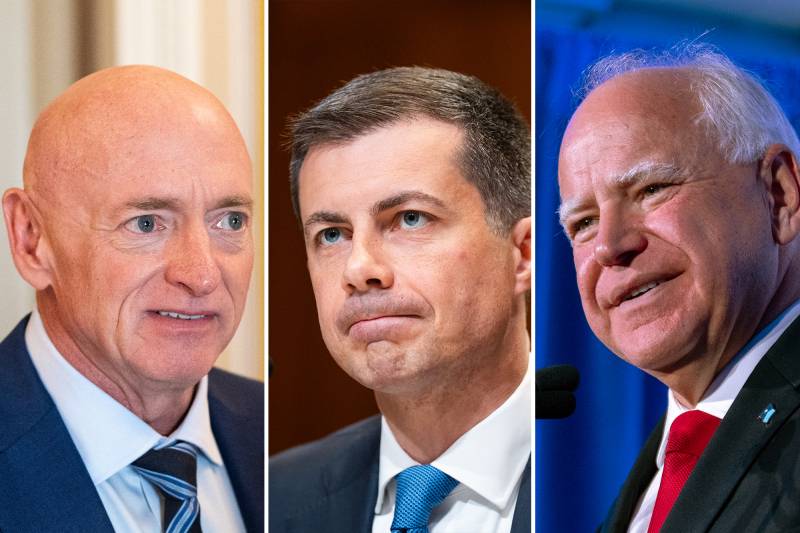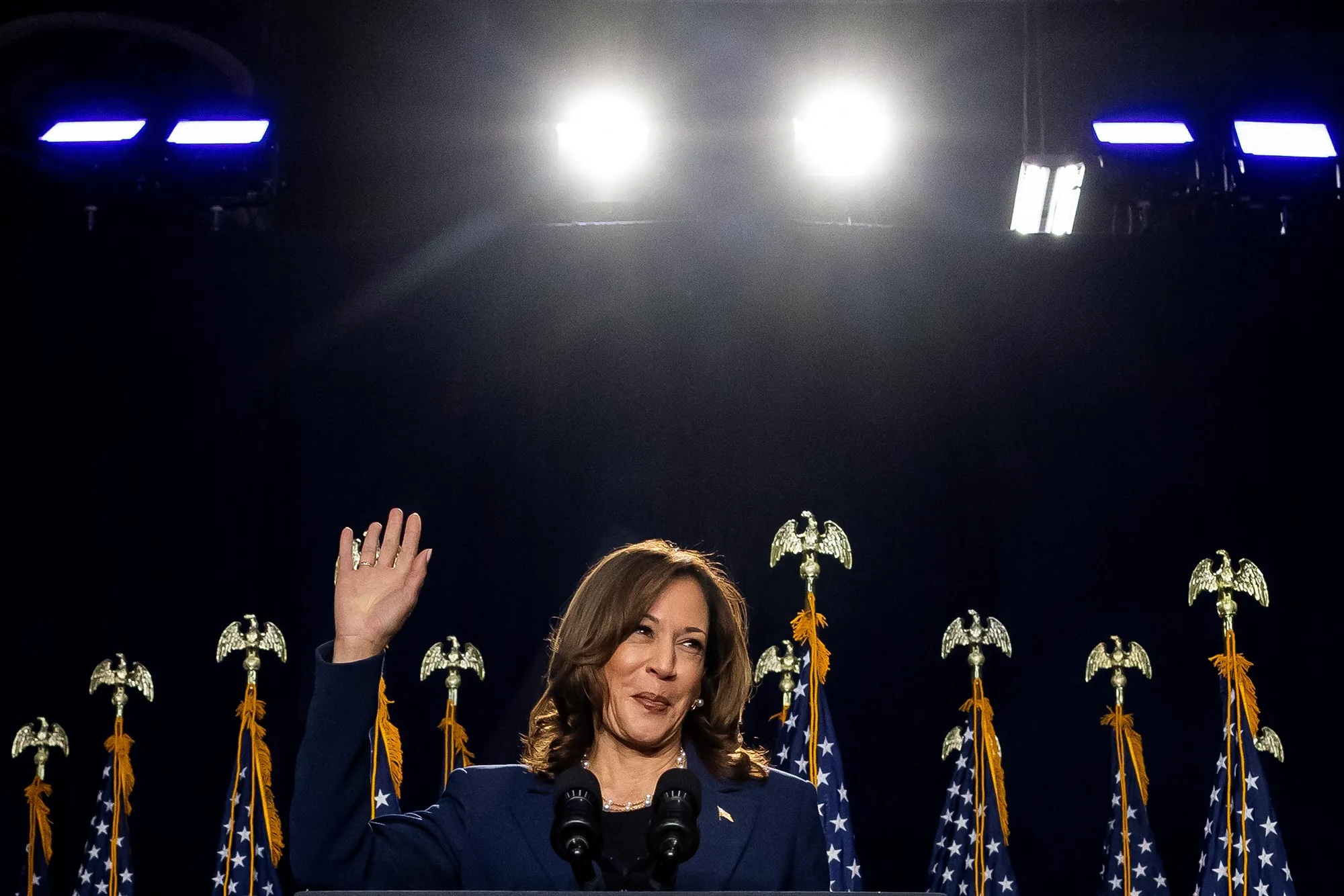Update 7:50 a.m. Tuesday: Vice President Kamala Harris announced Tuesday morning that she has selected Minnesota Governor Tim Walz as her running mate in the 2024 presidential election. Read more about Harris’ VP pick or jump to our analysis of Walz as a running mate candidate below.
When Will Kamala Harris Pick a VP — and Who Could Be Her Running Mate?

Original story continues:
Vice President Kamala Harris says she will choose a running mate by next Wednesday — a little over two weeks from the day she announced a run for president.
Usually, picking and vetting a vice presidential candidate takes months.
However, Harris — who entered the race on July 21 hours after President Joe Biden dropped out and became the official Democratic presidential nominee Friday — doesn’t have that kind of time, as the election is just 94 days away.
When will Kamala Harris announce her VP choice?
Harris was given an Aug. 7 deadline to pick a vice presidential candidate by the Democratic National Party, which wants to lock up the entire ticket ahead of its convention later this month.
Of course, Harris doesn’t have to take all that time and could name her vice president at any point in the next week.
That means an incredibly truncated timeline for vetting the potential vice presidential candidates — even as Harris hit the campaign trail and worked to stand up television ads and other campaign infrastructure.
Who could Kamala Harris choose for her VP?
Harris’ reported shortlist of candidates comes from all over the country and has a wide range of life experiences and backgrounds.
However, all have a few things in common: They’re all white men. And they are all from either purple swing states (also known as battleground states) that Democrats need to win in order to keep the White House — or they’ve been elected in red states that are tough for Democrats.
And two, like Harris, are former state attorneys general.
One person not on the shortlist: California Governor Gavin Newsom. While he’s spent the last few years burnishing his national profile and been a top surrogate for Biden — and longtime political ally of Harris — there are a couple reasons he’s not being considered.
One, the constitution prohibits a president and vice president from being from the same state. And two, there would be no political upside — and potentially some political damage — to choosing someone from liberal California. Vice presidential picks are largely about balancing a ticket and maybe even picking up some new voters, so someone from a battleground state is a safer pick when it comes to convincing swing voters to back the ticket.
Here’s who the likely Democratic nominee is considering as her running mate. (One note: two top contenders, Michigan Gov. Gretchen Whitmer and North Carolina Gov. Roy Cooper, took themselves out of the running preemptively).
Jump straight to one of Harris’ possible VP choices:

Pennsylvania Gov. Josh Shapiro
Shapiro, 51, was elected Pennsylvania attorney general the year Harris went to Washington, D.C., as a senator. However, of the vice presidential contenders, Harris knows Shapiro the best personally — they met nearly 20 years ago — and his state is part of the “blue wall” Democrats have relied on to win the Electoral College for decades. It’s a must-win this year.
Shapiro won Pennsylvania governorship by 15 points in 2022, six years after Trump’s surprise victory there shocked Democrats. He’s made a name for himself as both attorney general and governor as an outspoken proponent of reproductive rights. As attorney general, he took on the Trump administration, filing lawsuits over the travel ban, birth control access and gun control. He also made national headlines for his “bombshell” investigation into Catholic clergy sexual abuse.
Shapiro, who is Jewish, is an outspoken supporter of Israel — and to many on the left, a foe of pro-Palestinian protesters and the Palestinian cause more generally. Before the Oct. 7 Hamas attack and the war on Gaza, Shapiro supported Pennsylvania’s anti-divestment, boycott and sanctions law. He has also been vocally critical of pro-Palestinian college protests.
Arizona Sen. Mark Kelly
The son of two New Jersey police officers, Arizona Sen. Mark Kelly, 60, is a former U.S. Navy pilot who flew 39 combat missions during the Gulf War. He went on to become a NASA astronaut, taking four trips into space.
In 2011, his wife, then-Congresswoman Gabby Giffords, was targeted by a gunman as she held a constituent event outside a supermarket in Tucson. Giffords was shot in the head; six people were killed and 12 others injured. Two years later, after the Sandy Hook Elementary massacre, Giffords and Kelly formed an organization aimed at combating gun violence that has become one of the foremost groups pushing gun safety laws.
Kelly ran for Senate in 2020 and captured the seat long held by John McCain in a special election. Kelly’s narrow win flipped the seat from red to blue, and he won a full term in 2022 with a solid 5-point margin.
Kelly’s biography is impressive enough, but he also has bipartisan credibility in Arizona — a state Trump carried in 2016, and Biden won in 2020 — on an issue seen as a weakness for Harris: immigration.
Kelly is seen as an expert on the politics and technicalities of the U.S.-Mexico border and as a pragmatist who supports both more border security and preserving asylum.
Kentucky Gov. Andy Beshear
Trump won Kentucky by 26 points in 2020, yet Democratic Gov. Andy Beshear was able to hold onto the governorship last year with a comfortable 5-point margin and retains high approval ratings. And he’s launched this successful political career in a state dominated by the GOP — without compromising liberal values.
Like Harris, he previously served as his home state’s attorney general. The son of a former governor, he’s focused largely on bread-and-butter issues like the economy and infrastructure investment. But Beshar has also worked with the Republican-controlled Legislature to legalize medical cannabis and sports betting.
Additionally, he’s clashed with Republicans, vetoing a bill that banned transgender care for minors (Republican lawmakers overrode the veto) and signing an executive order that restored voting rights for 175,000 people with past felony convictions.
At 46, he’s among the youngest of the vice president contenders — 13 years younger than Harris. He’s also seen as an effective communicator.
Minnesota Gov. Tim Walz
Perhaps the most “dad” of the potential vice presidential picks, Democratic Minnesota Gov. Tim Walz has gone viral in the past week for his plainspoken and funny attacks on MAGA politics on cable news, including coining the “weird dudes” phrase to characterize Trump and his running mate, Ohio Sen. J.D. Vance.
Walz, 60, is a former high school teacher and congressman whose Midwestern sensibility is just one of his selling points. He helped flip the state Senate blue in 2022, leaving Democrats in control of both houses of the Legislature and then embarked on an ambitious progressive agenda.
Since that midterm election, Minnesota Democrats have codified abortion rights, passed protections for transgender people, approved paid sick and family leave, expanded voting rights and increased funding for affordable housing.
Unlike some of the other contenders, though, Walz doesn’t bring a swing state to the ticket: Minnesotans haven’t voted for a Republican presidential candidate since 1972.
Pete Buttigieg
Mayor Pete, as he’s colloquially known, has also become a cable news sensation on the left. Currently the Secretary of Transportation for President Biden, Pete Buttigieg’s highest elected office was as mayor of South Bend, Indiana — but he first made national waves four years ago during the 2020 Democratic presidential primary.
A former U.S. Navy Reserve officer, Pete Buttigieg is the first openly gay person confirmed to serve in a president’s Cabinet. In 2014, when he was mayor, he took a leave of absence to deploy to Afghanistan.
As transportation secretary, he’s overseen the rollout of Biden’s infrastructure law and federal responses to crises, including the collapse of the Francis Scott Key Bridge in Baltimore last year. He’s also worked on supply chain issues caused by the COVID-19 pandemic.
Buttigieg is from a solidly red state (Indianians last went for a Democratic presidential candidate in 2008). His husband, Chasten Buttigieg, has become relatively famous in his own right, and the two share adopted twins. His sexual orientation could be seen as a potential asset and drawback; if Harris picks him, it would be a groundbreaking ticket.